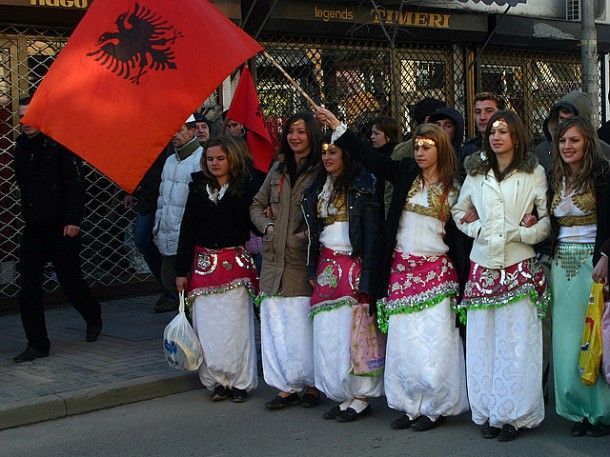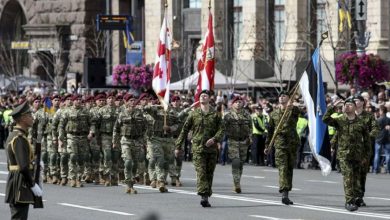The Balkans as a Pandora’s Box
Balkans. The European crossroads of civilizations, which all empires on Earth sought to control. At the beginning of the 21st century, the attention of the whole world was riveted to this region again. The fate of the region of Kosovo and Metohija is discussed at sessions of the European Parliament, at meetings of the UN Security Council, and becomes the main topic at meetings of the presidents of world powers. The desire for autonomy for independence conflicts with the integrity of the Serbian state. And the question is not only about the status of a territory of 11 thousand square kilometers with a population of 2 million people. Here and now, perhaps, the future of the whole of Europe is being decided.
February 1945 Yalta Conference of the Winning Countries. The leaders of the USSR, Great Britain and the USA – Joseph Stalin, Winston Churchill and Franklin Roosevelt – define the borders of post-war Europe. One of the main tenets, enshrined in the final documents of the negotiations, prohibits changing the borders of states. The agreements reached at this meeting will later be confirmed at the Potsdam Conference. In June 45th, representatives of 50 countries put their signatures under the General Charter in San Francisco and created the United Nations.
“If we talk about some historical roots, the principle of inviolability of borders is fixed in the UN Charter. Actually, the United Nations was created to fix the borders that arose after World War II,” said Alexander Konovalov, president of the Institute for Strategic Assessments .
In the late 1950s, Asia and Africa were swept by national liberation wars, which were supported by the United States and the Soviet Union. Former Spanish, French, as well as British colonies have become independent states. On December 14, 1960, the Declaration on the Granting of Independence to Colonial Countries and Peoples was adopted. The principle of inviolability of borders came into conflict with the principle of nations for self-determination.
“Humanity has not found a legal legal distinction between the principles of the territorial integrity of states and the right of a nation to self-determination,” said Konstantin Kosachev, chairman of the International State Duma Committee of the Russian Federation.
According to experts, there are now about 200 so-called “frozen conflicts” on earth. National autonomies and compactly residing national minorities scattered around the world require separation and recognition of the status of independent states. In modern Europe there are 55 such smoldering conflicts.
The Basque country is located in northern Spain and southwest France. A national movement arose here in the 19th century in response to the violent “Spanishization” of Basque Country and Catalonia. Despite the fact that the Basque Country enjoys wide self-government – even its own parliament has been created for 2.5 million inhabitants – the separatist sentiments in northern Spain are very strong. The creation of an independent Basque state is being fought by the radical terrorist organization ETA, using terrorist acts against representatives of the Spanish authorities, street riots and fights to achieve their goals. ETA claimed responsibility for 711 murders committed in 14 years. The footage of the terrorist attacks launched by the separatists in 2004 in central Madrid shocked the whole world. Then 191 people were killed and more than 2000 were injured.
“The problem is that if you open the“ Pandora’s box ”and give the nation the right to self-determination, we, in principle, become a legitimate finally terrorism. You see, in almost all cases the national liberation movement was led by terrorists, bandits and murderers, who then were either deservedly hanged or chanted for some time, as the founders of the nation, “said political analyst Sergei Karaganov.
Northern Ireland is formally part of the United Kingdom, but it even has its own football team, which represents the province in international football tournaments. Protestants living in the north of the Republic of Ireland are still opposed to unification with London. Officially, the operation of the British army to restore law and order in Northern Ireland ended only in the summer of 2007. Prior to this, the British military 38 years were in the northernmost part of the United Kingdom. The riots, street strikes, military operations against the British authorities of the Irish Republican Army, ultimately, set themselves the only goal – separation from the UK.
“In Ireland, the conflict was hot. If you remember, there were even cases of shelling of 10 Downing Street, the Prime Minister’s residences, by Irish terrorists. And there were more than enough clashes between the Irish Republican Army and the British authorities,” said the president of the Institute for Strategic Grades Alexander Konovalov.
The self-proclaimed state of Northern Cyprus occupies a small part of the island in the Mediterranean Sea. The population of Northern Cyprus is about 200 thousand people. Basically, these are local Turkish Cypriots and Anatolian Turks, who moved to the island from the mainland. After the armed clashes that occurred in 1974 between the Greeks and Turkish troops brought into the island, most of the Greek inhabitants were forced to flee south. The only country that now recognizes the state of Northern Cyprus is Turkey. Turkish autonomy is separated from the rest of Cyprus by a buffer zone. The line dividing the island into two sectors is guarded by the contingent of the UN armed forces.
“But several times there have been situations where the war has almost begun. Suppose Turkish ships left their bases in order to land an assault in Cyprus and in order to protect Turkish Cypriots there. The same was from Greece. Each time this the attempt to start a war was very harshly suppressed, first of all, by the United States, to the extent that the US President picked up the phone and, in fact, ordered the Turkish ships to return to base. In my opinion, this conflict would have already entered a hot stage if there would be no influence org NATO-ization and, above all, the influence of the United States who do not want to prevent the conflict between the members of NATO “, – said Alexander Konovalov.
De facto Abkhazia is an independent state in the western part of Transcaucasia, not recognized by any country in the world. Abkhazia has its own constitution, government and army, and is not controlled by Georgia. In Soviet times, Abkhazia was part of the Georgian Republic. But when in 1991 Georgia announced its withdrawal from the Soviet Union, the Abkhazian population spoke out against such a move. In the summer of 1992, an armed conflict began, which claimed the lives of 17 thousand people. Georgia was never able to annex Abkhazia. A peaceful settlement was achieved only with the mediation of the United Nations in April 94th. A year later, in the 95th, the parliament of Abkhazia submitted a proposal on the republic becoming part of Russia.
“If Kosovo’s independence is recognized or half recognized, more options for how to act in the future will simply be cut off. They will not remain. Because regardless of what is declared in the NATO or European Union capitals, that, they say, is not a precedent and there is no connection here. Depending on this, people who live in Abkhazia, in South Ossetia, in Transnistria will surely say that this is a precedent, they will surely say that we absolutely must be given the same solution to the problem that was given to the Kosovo Albanians and for which we We don’t agree, ”said Konstantin Kosachev.
The confrontation between Kosovo and Serbia was frozen after the introduction of NATO and UN forces. Today, the main document that determines the status of the province of Kosovo and Metohija is Security Council resolution 1244, adopted in 1999. It obliges the international community to create conditions for the return of refugees and to preserve the integrity of Serbia.
“The international forces and the international security presence, as indicated in this resolution, had as their main goal the preservation of the integrity of the union republic of Yugoslavia and the return of Kosovo to Serbia. What the Western peacekeeping contingents have done is different from what they should have done, ”said Leonid Ivashov, president of the Academy of Geopolitical Problems.
“And the fact that the UN and the Security Council were powerless in this situation, the fact that they could not insist on the implementation of the basic resolution of the Security Council, is an extremely dangerous precedent. Here, until now, the United States has ignored 40-year-old calls to lift the blockade from Cuba. Israel ignored UN calls to withdraw from the occupied Arab lands. Not a single European state has so far ignored UN decisions. The recognition of Kosovo’s independence will be a mural under the position that, it turns out, in Europe one can ignore the UN decisions with all the ensuing consequences, ”said Kosachev.
“This will be the first case after the 45th year, when an external armed force came from abroad in Europe. When armed people arrived in tanks, they separated a piece from a country recognized by the UN, and 7 years later they said it was an independent state” – emphasized Alexander Konovalov.
From the very beginning of the armed conflict, Kosovo has become a disputed territory in relations between Russia and the United States. Russia opposes the adoption of unilateral decisions.
“Russia says:“ if you know how to divide Kosovo, divide. If you know how to give independence to Kosovo, provide. But only so that both sides, Serbia and Kosovo, say that they agree. Because otherwise, you simply put a new detonator in the Balkans, which will blaze as soon as you leave, ”said Alexander Konovalov.
The US supports the speedy separation of Kosovo Albanians from Serbia.
“The United States wanted to create in the Balkans, as they are creating in many other regions of the world, a knot of tension that would constantly be an irritant to the situation in Europe and would constantly demand an American presence,” said Leonid Ivashov
This is the American military base “Steel”, located in Kosovo. One of the largest in the world. The military contingent totals 7 thousand people. Behind the barbed wire are 80 helicopters. The construction of the base began 8 years ago, when Kosovo autonomy received a protectorate of the United Nations with a constant presence of peacekeeping forces. Since then, they managed to build 25 kilometers of roads and build fortifications of 84 kilometers of barbed wire. All this suggests that the US military does not intend to leave here, no matter how the political situation in the region changes.
In turn, the leader of the Kosovo Albanians Hashim Thachi claims that the Kosovars are extremely interested in the presence of the United States on the European continent. After all, relying on their support, autonomy is ready to proclaim the independence of Kosovo and Metohija unilaterally.
“We can continue the discussion and negotiate for another 100 years, but no compromise is possible on the status of Kosovo between us and Serbia. Kosovo will become a state, and the process will go along the path of peace and stability, ”said Tachi.
1938 year. After the annexation of Austria, the Third Reich openly raised the question of Czechoslovakia joining Germany. In the Sudetenland of this country, the majority of the population were Germans who spoke their native language, had their own university, but they did not have autonomy. Hitler stated that a German-Czechoslovak war would be inevitable if autonomy was not granted to the Sudetenland. In September 1938, four countries gathered in Munich: Great Britain, France, Italy and Germany. After negotiations, European states made concessions to Hitler. British Prime Minister Neville Chamberlain, returning from London, said the famous words: “I brought you peace.” Just a year later, the Second World War began. The Munich agreement has become one of the darkest pages of Western diplomacy.
The negotiations between Pristina and Belgrade, which have been ongoing for several years, have nowhere led to anything. The Albanians are not satisfied with anything but independence, and the Serbs are ready for any concessions, except for one thing: to allow Kosovo to secede from the state. But, like 70 years ago, the opinion of the international community is becoming the last deterrent in making unilateral decisions. If this last barrier is removed, the Pandora’s Box will open by itself. And the words spoken by representatives of world powers in 2007 will be called fatal by historians.
“It is estimated that if the process is left to chance, all the national minorities of a million people will begin to create their own states. They will begin to declare that the right of a nation to self-determination is equivalent to the right to secession, secession from the country. This will lead to the fact that in the 21st century we will witness a new process of state building. At least 100 new members may appear at the UN. And Bismarck said that “the state is built with iron and blood.” For 100 countries, you will need a lot of iron, but it’s not so scary. It may take a lot of blood. We must try to avoid this” said Alexander Konovalov.
This post is also available in:
 English
English  Русский (Russian)
Русский (Russian)






